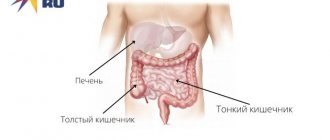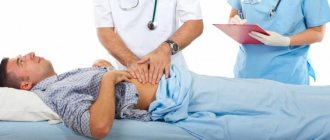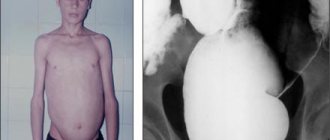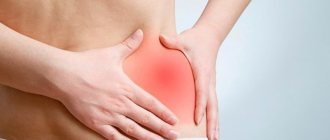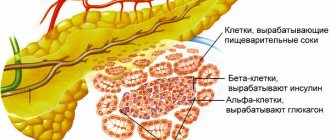Pain in the epigastrium (“in the pit of the stomach”, epigastralgia)
It is better to consult a doctor rather than search for answers on the Internet yourself and waste your time!
PAIN IN THE ABDOMEN is a serious signal, and sometimes a “cry” from the body about its problem. This is one of the frequent complaints in patients with diseases not only of the gastrointestinal tract, but also of other body systems. Sometimes even specialists find it difficult to immediately determine the cause of pain. It is important to know that abdominal pain sometimes requires emergency treatment.
EPIGASTRIC PAIN (“UNDER THE SPONGE”, EPIGASTRALGIA) – pain in the abdomen, localized between the xiphoid process of the sternum and the navel. It may be associated with many diseases not only of the gastrointestinal tract, but also of other organs. Epigastric pain can be acute or chronic.
Acute pain in the epigastrium occurs abruptly, grows quickly and becomes so intense and unbearable that it disrupts human activity. This pain can be cutting, bursting, cramping, stabbing or “dagger” in nature.
“Symptoms of anxiety”: if acute abdominal pain is of high intensity, accompanied by fever, chills, increased heart rate, nausea, vomiting, severe bloating in the abdomen, constipation or diarrhea, the appearance of black, tarry stools, tension in the anterior abdominal wall, severe pain If you lightly touch the stomach or push the bed, you should immediately consult a doctor, as an examination of the abdomen, blood tests, ultrasound examination of the abdominal cavity and, possibly, other studies are necessary to exclude acute surgical and other serious pathologies.
Causes of acute epigastric pain:
- acute appendicitis (at the onset of the disease)
- diseases of the stomach and duodenum (acute gastritis, ulcers, cancer)
- hiatal hernia (strangulation)
- pancreatic diseases (acute pancreatitis, cysts, cancer)
- diseases of the biliary system (acute cholecystitis, cholelithiasis and biliary colic, biliary dyskinesia with spasm of the gallbladder)
- intestinal diseases (inflammatory diseases, transverse colon cancer)
- damage to the vessels of the abdominal cavity (dissecting aortic aneurysm, thrombosis and embolism of the abdominal vessels)
- hernia of the white line of the abdomen (strangulation)
- diseases of the nervous system (shingles (herpes zoster), damage to the solar plexus, intercostal neuralgia)
- heart disease (acute myocardial infarction, acute pericarditis)
Chronic epigastric pain – present constantly or periodically for 3 or more months. It can be aching, burning, pulling, bursting, and sometimes feels like heaviness or discomfort.
“Symptoms of anxiety”: if chronic abdominal pain is accompanied by weight loss, fever, loss of appetite, the appearance of blood in the stool, jaundice, the development of edema, an increase in abdominal volume, increasing weakness, you should quickly consult a doctor to rule out severe organic pathology.
Causes of chronic epigastric pain:
- diseases of the stomach and duodenum (chronic gastritis, duodenitis, peptic ulcer, functional dyspepsia, cancer)
- diseases of the biliary system (functional biliary disorders, chronic cholecystitis)
- pancreatic diseases (chronic pancreatitis, cyst, cancer)
- bowel diseases (irritable bowel syndrome, transverse colon tumor)
- abdominal vascular diseases (atherosclerosis of the aorta, mesenteric vessels, vasculitis)
- diseases of the spine (osteochondrosis with radicular syndrome)
In our gastroenterology department, they will find the cause of epigastric pain and prescribe the necessary examination and treatment. We have the most modern expert-class equipment (ultrasound, endoscopy). Experienced and attentive specialists - a gastroenterologist, a neurologist, a surgeon, ultrasound doctors and endoscopists, and, if necessary, a psychotherapist - will come to your aid.
Sucks in the pit of the stomach
When faced with danger, acute sensations, fear or getting into a nervous situation, a person may feel discomfort in the epigastric region, which cannot be called painful. They say about it like this: “It sucks in the pit of your stomach.” The fact is that when the nervous system is excited, the motor activity of the stomach also increases. The second situation in which you can experience this sensation is hunger or active secretion of gastric secretions. What is the sucking feeling in the epigastric region connected with: nerves or the work of the stomach? Let's clarify this issue.
You can start sucking in the pit of your stomach a couple of hours after a meal. This feeling is encountered more often by individuals with a choleric character or simply by impressionable people with an active, agile psyche. There is even an official name for the desired sensation: the motor migratory complex.
MMC is the contractile activity of the stomach, which is repeated cyclically in the interdigestive time period. Typically, the motor migratory complex occurs during a period when the digestive tract is at rest. As soon as a person has eaten, the MMC is interrupted, as the activity of the organ changes. Why does the body need MMC? In the process, food debris, mucus, bacteria, and gastric secretions migrate through the digestive tract.
The contractile motor cycle lasts from one and a half to two hours, most of this time occurs in the resting phase (first phase). Muscle contractions (second phase) occur later, increase gradually, reaching their greatest intensity in the third phase. It lasts no more than five to six minutes and is a maximum outbreak of gastrointestinal motility activity, which doctors call the motor migratory complex. This is what people perceive as sucking in the pit of the stomach.
When the third phase ends, a short passage begins when motor activity decreases. A decrease in motility is also associated with diet - the more hungry a person is, the lower the contractile activity of the gastrointestinal tract. So, after a day of fasting, activity drops by 70 percent.
The sucking sensation in the epigastric region should not be confused with hunger pain in the stomach. This is a slight feeling of emptiness, not pain. Hunger pains are the result of prolonged fasting, more than three to four days. Sucking in the epigastrium begins much earlier - from several hours to a day, depending on the speed of metabolism in the human body.
Most often, the stomach is in good shape in young, active, healthy people. Also, gastric tone and the feeling of “sucking in the pit of the stomach” are familiar to those who have low blood sugar. If there is a sucking sensation in the pit of the stomach at night, then we may be talking about a hormonal imbalance. Thus, discomfort in the epigastric region is often caused by a lack of cortisol, leptin, ghrelin or neuropeptides.
Why does it suck in the pit of the stomach?
Table 2. Why does it suck “in the pit of the stomach”?
| Time period, circumstances | Possible reason |
| No more than five minutes, goes away on its own | The stomach muscles move; in other words, the organ simply stretches. |
| More than ten minutes, not associated with hunger | State of stress, panic. You shouldn’t immediately seize this feeling, you need to switch to something, drink mint tea, lie down. |
| Immediately after a meal or within a short time after a meal | Reduced blood sugar levels. Mistaking the feeling of thirst for a feeling of hunger (the centers of saturation with food and liquid are located nearby, so a person often feels hungry when he is actually thirsty). |
| Regularly throughout the day | Stress, fatigue, sleep disturbances, too active work schedule, inability to fully restore the body’s strength. |
| After a meal that includes fatty, hot, spicy foods | Stress, fatigue, sleep disturbances, too active work schedule, inability to fully restore the body’s strength. |
| After a meal that includes fatty, hot, spicy foods | Pancreatic reaction. As a rule, a sucking sensation in the epigastrium is accompanied by belching and heartburn. |
| 6-7 hours after eating, accompanied by increasing pain | Gastritis, peptic ulcer. It is necessary to visit a gastroenterologist and examine the stomach. |
help yourself
There is still an opinion that if you have heartburn you should take soda. No, don't. Nothing good will come from this: firstly, soda itself can damage the mucous membrane of the esophagus, and secondly, it causes increased gas formation, which only stretches the stomach. For heartburn, medications belonging to the group of antacids (Almagel, Maalox, phosphalugel and others) are needed. And some people manage to get rid of it by simply drinking a glass of warm water or milk.
Advertising
Why does cardiac insufficiency occur?
And why do the muscle gates not close tightly? There are many reasons for this, and they can be conditionally divided into “diseases” and “non-diseases”.
Of the “non-diseases,” heartburn is most often caused by eating too much, simply overeating. A stomach filled to capacity is stretched beyond measure, and the diameter of the cardia increases because of this. It is clear that a stretched valve muscle can no longer work properly. The same thing happens when we stretch the stomach not with food, but with gases - they are found in sparkling wines, beer, lemonade and other carbonated drinks... Now do you understand why they cause heartburn?
Heartburn also occurs from coffee and pickled cucumbers. from fried potatoes, oranges, etc., etc. The list goes on and on. Everyone has their own, and everyone can, having written it down somewhere for memory, turn away from foods that cause heartburn, no matter how tempting they may be.
Among other “non-diseases” it makes sense to mention age-related weakening of the muscles of the esophagus, which is felt already somewhere after 40 and, unfortunately, cannot be corrected. But obesity and smoking are also not the last causes of heartburn - these are already “diseases” that need to be gotten rid of.
Let everyone in, don't let anyone out
The main cause of heartburn is called “gastroesophageal reflux” in avian medical language. “Gastro” means stomach in Latin, “esophagus” means esophagus, and the mysterious word “reflux” (not to be confused with reflex) means movement or flow in the opposite direction. In other words, gastroesophageal reflux (sounds like a magic spell from a Harry Potter book) is simply the entry of stomach contents into the esophagus, that is, its reverse reflux.
As you know, the basis of gastric contents is hydrochloric acid of very high concentration. The stomach is protected from its caustic effects, but the esophagus is, alas, protected. At the junction of these organs (it is called the cardia) there is a muscle, the fibers of which in a dense ring cover the opening between them. This muscle (sphincter, that is, “squeezer”) works in such a way that it allows only one-way movement of food - from the esophagus to the stomach.
If she stops coping with her duties, the acidic contents of the stomach begin to penetrate the esophagus. This condition is called cardia failure. As mentioned above, the esophagus is defenseless against the destructive effects of hydrochloric acid, which burns its inner lining. It is these torments of the esophagus that give rise to what we call heartburn.
Folk remedies for heartburn
White cabbage juice (1/2 cup) and raw potato juice (1/3 cup) help with heartburn. There are more complex recipes, for example, this one: take 20 g of St. John's wort, dried herbs and yarrow herbs, 3 tbsp. Pour spoons of this mixture into a liter of boiling water and leave for two hours. Drink 1/2 glass 4-5 times a day. Centaury infusion also helps well (1 tablespoon of herb in 2 cups of boiling water).
Such a seemingly trifle - heartburn. But how nice it is not to feel like a heretic who is sentenced to be burned from the inside!
Doctor, I have heartburn!
If you discover heartburn, you don’t have to rush to the doctor. First you need to understand what food causes it and try to eliminate it from your diet. It is very important not to overeat. To do this, you need to give up giant portions and eat more often, but less. Don't forget to drink. And as for losing weight and quitting smoking – no comments.
When should you go to the doctor? As soon as heartburn begins to interfere with life, that is, if it occurs almost every day or is accompanied by belching and abdominal pain. There is no way to hesitate here.
To find out the cause of heartburn, the doctor will most likely prescribe a gastroscopy. This method allows you to reliably examine the upper parts of the digestive tract. With the results in hand, the doctor will advise you on what to do and how to eliminate heartburn.



